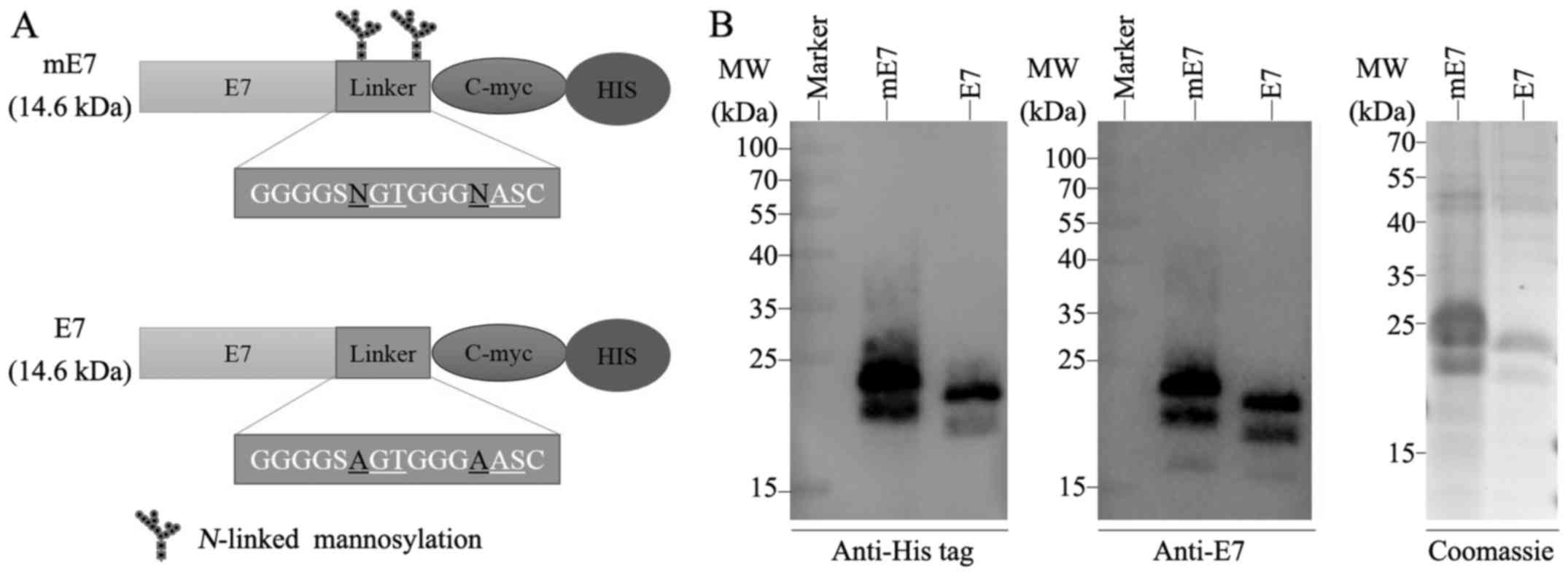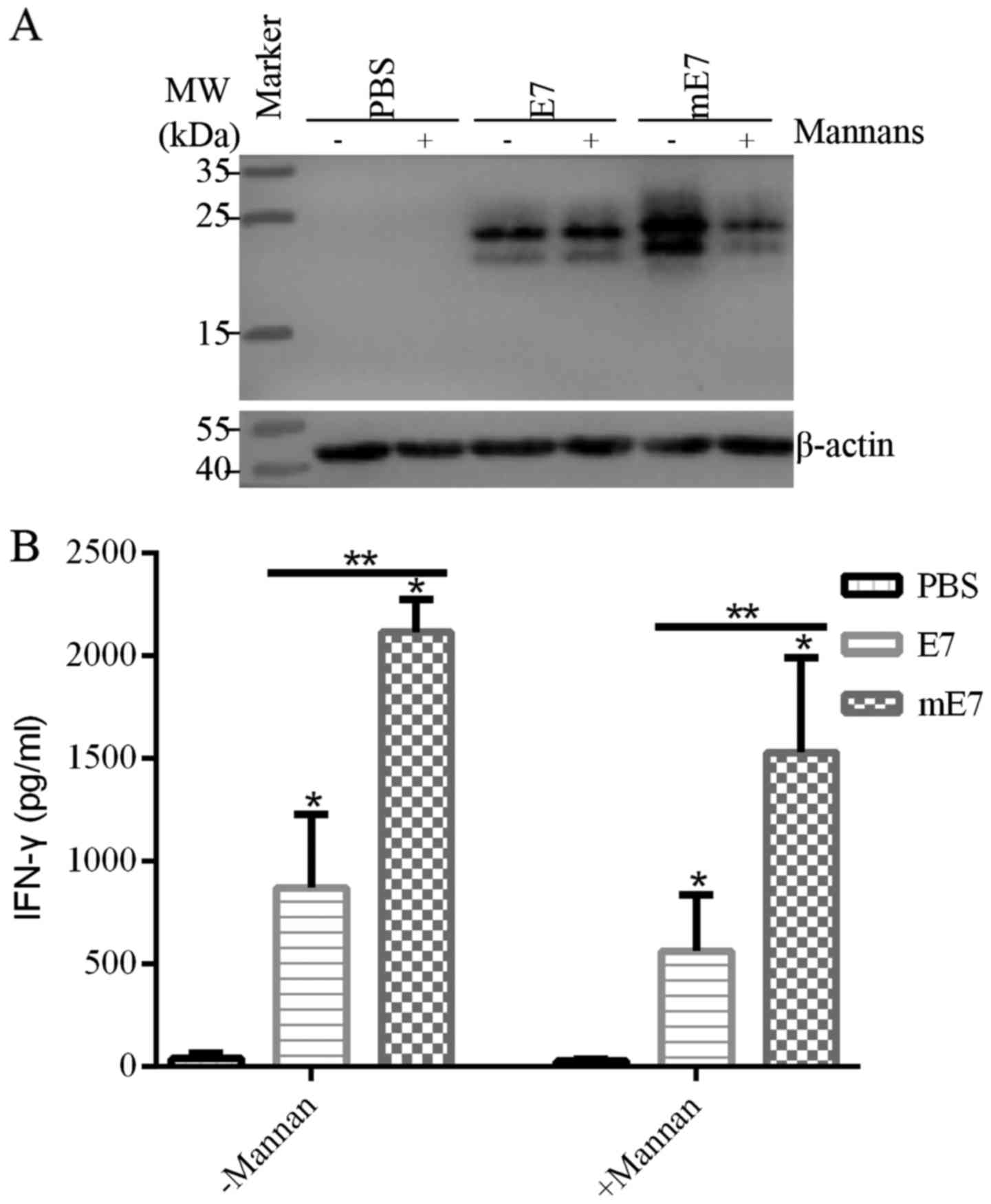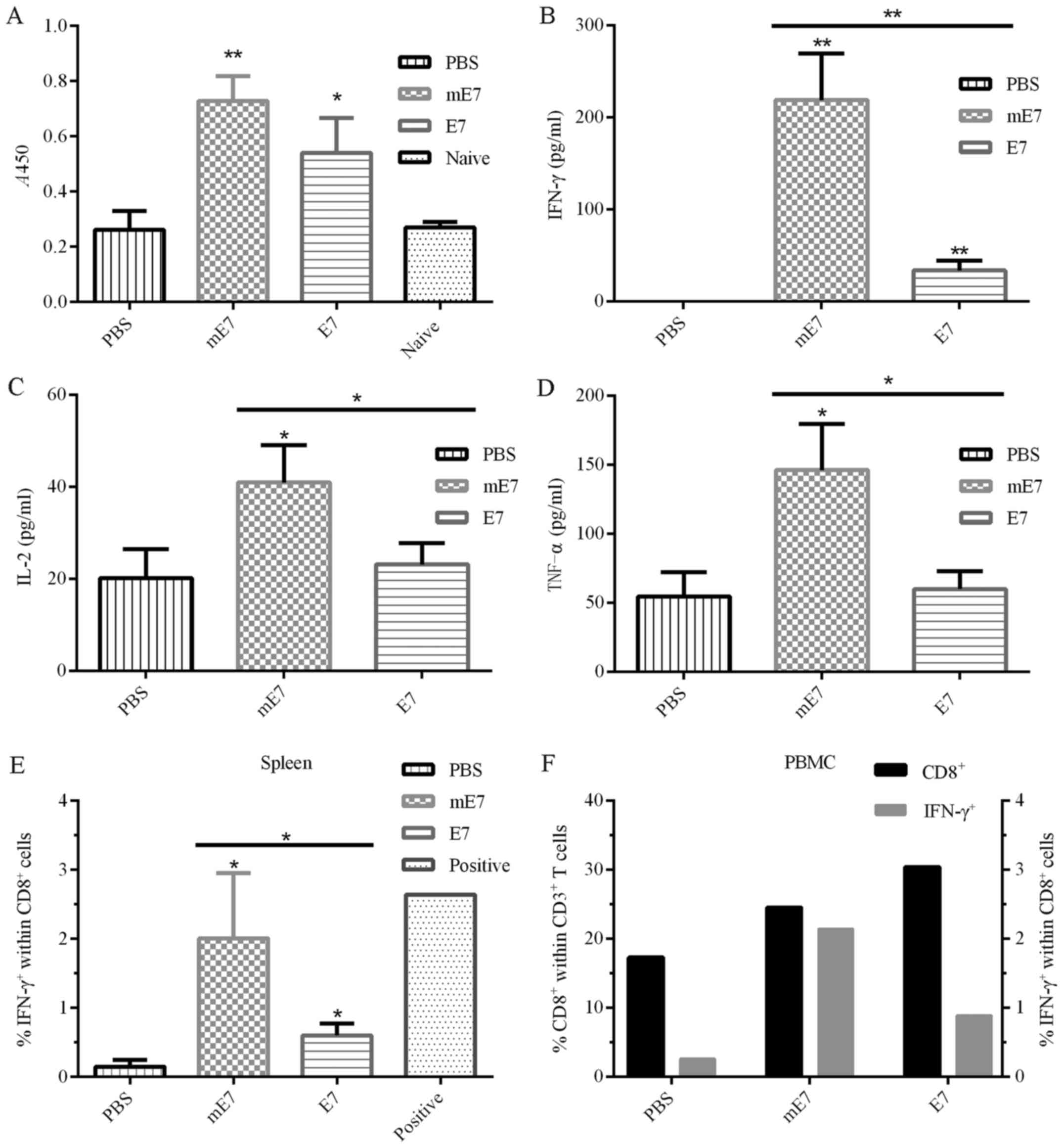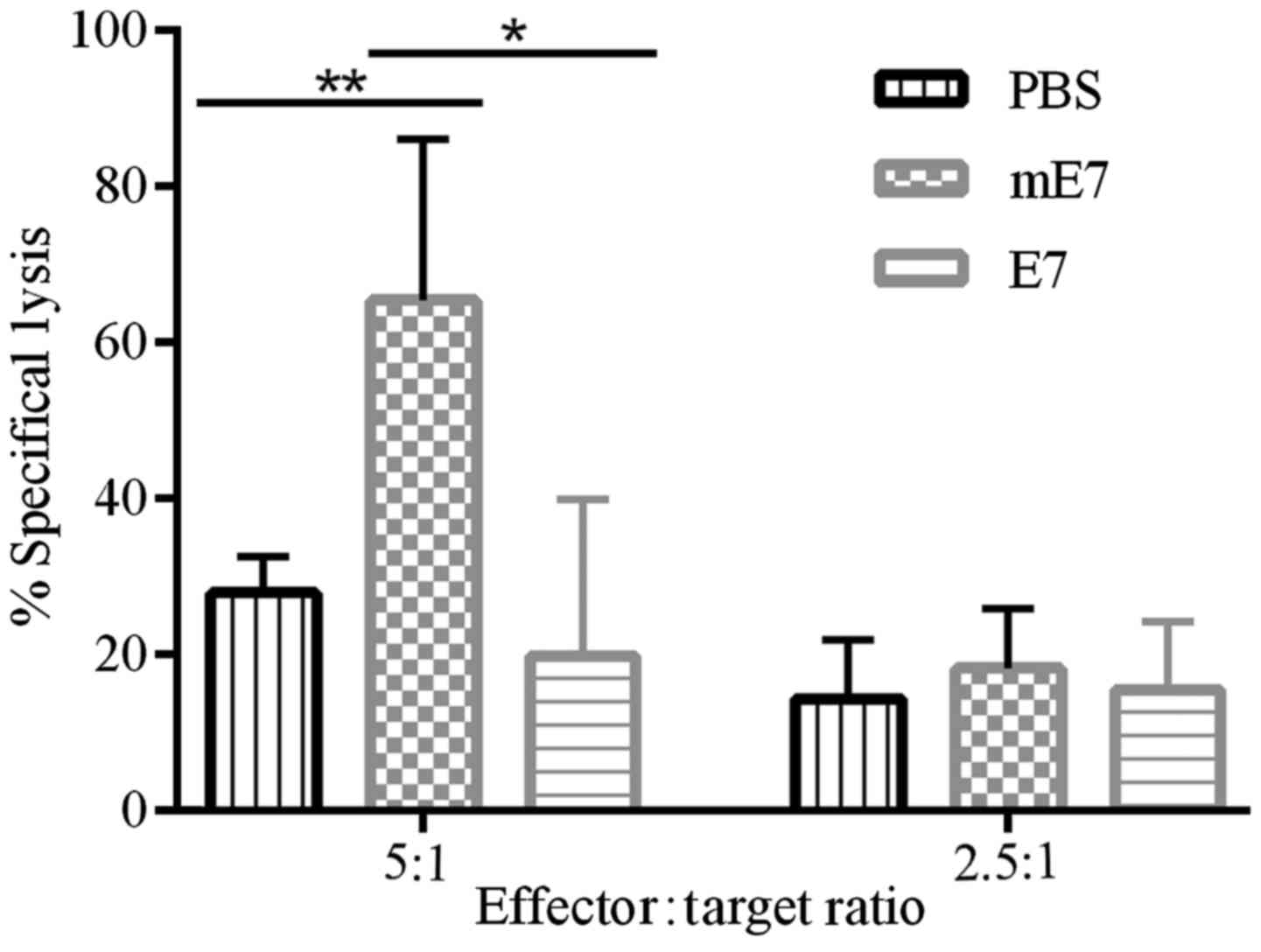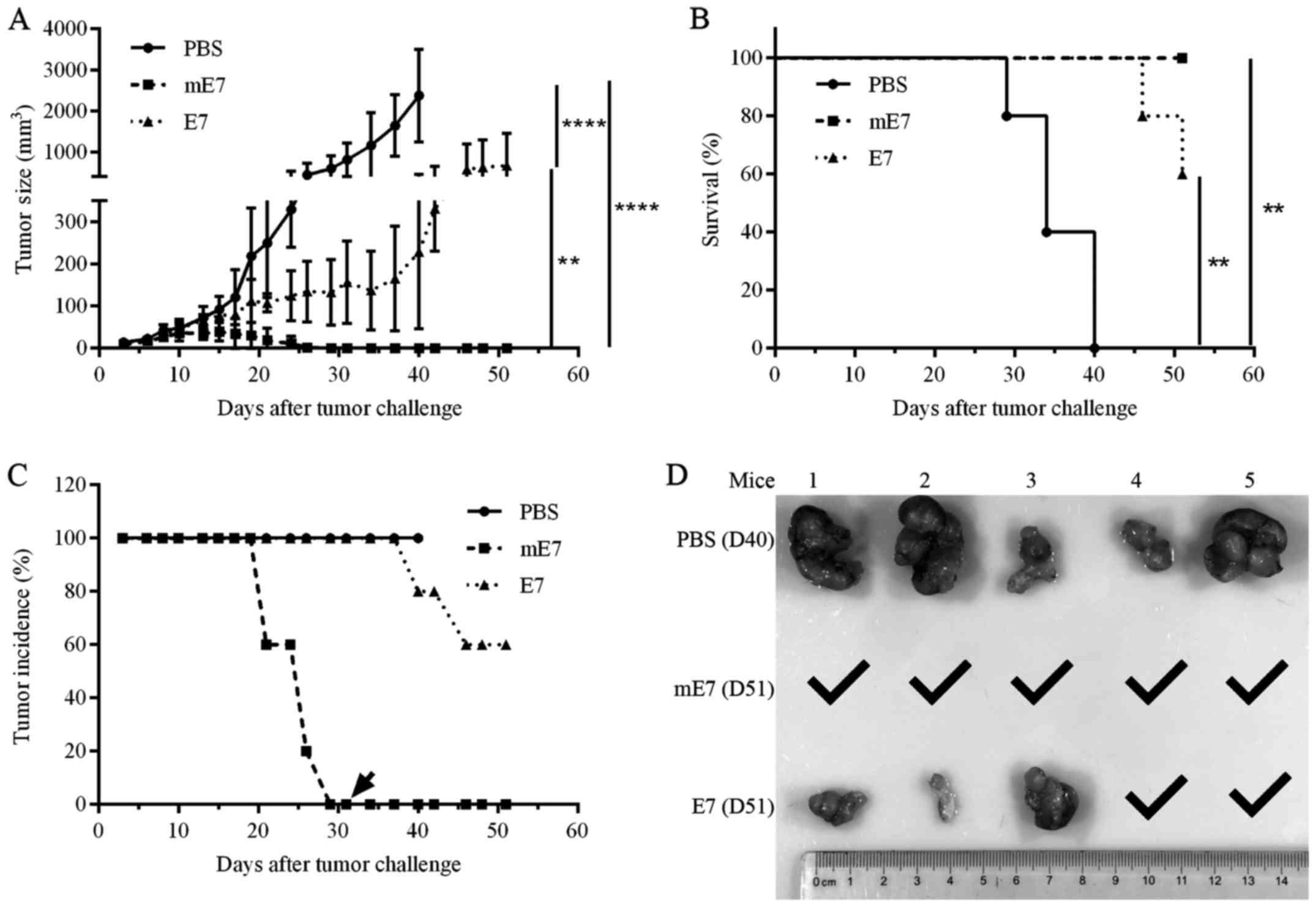|
1
|
Torre LA, Bray F, Siegel RL, Ferlay J,
Lortet-Tieulent J and Jemal A: Global cancer statistics, 2012. CA
Cancer J Clin. 65:87–108. 2015. View Article : Google Scholar : PubMed/NCBI
|
|
2
|
Muñoz N, Bosch FX, Castellsagué X, Díaz M,
de Sanjose S, Hammouda D, Shah KV and Meijer CJ: Against which
human papillomavirus types shall we vaccinate and screen? The
international perspective. Int J Cancer. 111:278–285. 2004.
View Article : Google Scholar : PubMed/NCBI
|
|
3
|
Howley P, Schiller J and Lowy D:
PapillomavirusesFields Virology. Knipe DM and Howley PM: 6th.
Lippincott Williams & Wilkins; Philadelphia, PA: pp. 1662–1703.
2013
|
|
4
|
Herrero R, González P and Markowitz LE:
Present status of human papillomavirus vaccine development and
implementation. Lancet Oncol. 16:e206–e216. 2015. View Article : Google Scholar : PubMed/NCBI
|
|
5
|
Schiller JT and Müller M: Next generation
prophylactic human papillomavirus vaccines. Lancet Oncol.
16:e217–e225. 2015. View Article : Google Scholar : PubMed/NCBI
|
|
6
|
Hildesheim A, Herrero R, Wacholder S,
Rodriguez AC, Solomon D, Bratti MC, Schiller JT, Gonzalez P, Dubin
G, Porras C, et al Costa Rican HPV Vaccine Trial Group, : Effect of
human papillomavirus 16/18 L1 viruslike particle vaccine among
young women with preexisting infection: A randomized trial. JAMA.
298:743–753. 2007. View Article : Google Scholar : PubMed/NCBI
|
|
7
|
Su JH, Wu A, Scotney E, Ma B, Monie A,
Hung CF and Wu TC: Immunotherapy for cervical cancer: Research
status and clinical potential. BioDrugs. 24:109–129. 2010.
View Article : Google Scholar : PubMed/NCBI
|
|
8
|
Zur Hausen H: Papillomaviruses and cancer:
From basic studies to clinical application. Nat Rev Cancer.
2:342–350. 2002. View
Article : Google Scholar : PubMed/NCBI
|
|
9
|
Frazer IH: Prevention of cervical cancer
through papillomavirus vaccination. Nat Rev Immunol. 4:46–54. 2004.
View Article : Google Scholar : PubMed/NCBI
|
|
10
|
Mellman I and Steinman RM: Dendritic
cells: Specialized and regulated antigen processing machines. Cell.
106:255–258. 2001. View Article : Google Scholar : PubMed/NCBI
|
|
11
|
Drickamer K: C-type lectin-like domains.
Curr Opin Struct Biol. 9:585–590. 1999. View Article : Google Scholar : PubMed/NCBI
|
|
12
|
McGreal EP, Miller JL and Gordon S: Ligand
recognition by antigen-presenting cell C-type lectin receptors.
Curr Opin Immunol. 17:18–24. 2005. View Article : Google Scholar : PubMed/NCBI
|
|
13
|
Engering AJ, Cella M, Fluitsma D,
Brockhaus M, Hoefsmit EC, Lanzavecchia A and Pieters J: The mannose
receptor functions as a high capacity and broad specificity antigen
receptor in human dendritic cells. Eur J Immunol. 27:2417–2425.
1997. View Article : Google Scholar : PubMed/NCBI
|
|
14
|
Tan MC, Mommaas AM, Drijfhout JW, Jordens
R, Onderwater JJ, Verwoerd D, Mulder AA, van der Heiden AN,
Scheidegger D, Oomen LC, et al: Mannose receptor-mediated uptake of
antigens strongly enhances HLA class II-restricted antigen
presentation by cultured dendritic cells. Eur J Immunol.
27:2426–2435. 1997. View Article : Google Scholar : PubMed/NCBI
|
|
15
|
Lam JS, Mansour MK, Specht CA and Levitz
SM: A model vaccine exploiting fungal mannosylation to increase
antigen immunogenicity. J Immunol. 175:7496–7503. 2005. View Article : Google Scholar : PubMed/NCBI
|
|
16
|
Levitz SM and Specht CA: The molecular
basis for the immunogenicity of Cryptococcus neoformans
mannoproteins. FEMS Yeast Res. 6:513–524. 2006. View Article : Google Scholar : PubMed/NCBI
|
|
17
|
Keler T, Ramakrishna V and Fanger MW:
Mannose receptor-targeted vaccines. Expert Opin Biol Ther.
4:1953–1962. 2004. View Article : Google Scholar : PubMed/NCBI
|
|
18
|
Irache JM, Salman HH, Gamazo C and
Espuelas S: Mannose-targeted systems for the delivery of
therapeutics. Expert Opin Drug Deliv. 5:703–724. 2008. View Article : Google Scholar : PubMed/NCBI
|
|
19
|
Moyle PM, Olive C, Ho MF, Pandey M, Dyer
J, Suhrbier A, Fujita Y and Toth I: Toward the development of
prophylactic and therapeutic human papillomavirus type-16
lipopeptide vaccines. J Med Chem. 50:4721–4727. 2007. View Article : Google Scholar : PubMed/NCBI
|
|
20
|
Rauen J, Kreer C, Paillard A, van Duikeren
S, Benckhuijsen WE, Camps MG, Valentijn AR, Ossendorp F, Drijfhout
JW, Arens R, et al: Enhanced cross-presentation and improved CD8+ T
cell responses after mannosylation of synthetic long peptides in
mice. PLoS One. 9:e1037552014. View Article : Google Scholar : PubMed/NCBI
|
|
21
|
Lin KY, Guarnieri FG, Staveley-O'Carroll
KF, Levitsky HI, August JT, Pardoll DM and Wu TC: Treatment of
established tumors with a novel vaccine that enhances major
histocompatibility class II presentation of tumor antigen. Cancer
Res. 56:21–26. 1996.PubMed/NCBI
|
|
22
|
Lutz MB, Kukutsch N, Ogilvie AL, Rössner
S, Koch F, Romani N and Schuler G: An advanced culture method for
generating large quantities of highly pure dendritic cells from
mouse bone marrow. J Immunol Methods. 223:77–92. 1999. View Article : Google Scholar : PubMed/NCBI
|
|
23
|
Satchidanandam V, Kumar N, Jumani RS,
Challu V, Elangovan S and Khan NA: The glycosylated Rv1860 protein
of Mycobacterium tuberculosis inhibits dendritic cell mediated TH1
and TH17 polarization of T cells and abrogates protective immunity
conferred by BCG. PLoS Pathog. 10:e10041762014. View Article : Google Scholar : PubMed/NCBI
|
|
24
|
Naito S, von Eschenbach AC, Giavazzi R and
Fidler IJ: Growth and metastasis of tumor cells isolated from a
human renal cell carcinoma implanted into different organs of nude
mice. Cancer Res. 46:4109–4115. 1986.PubMed/NCBI
|
|
25
|
Gerngross TU: Advances in the production
of human therapeutic proteins in yeasts and filamentous fungi. Nat
Biotechnol. 22:1409–1414. 2004. View
Article : Google Scholar : PubMed/NCBI
|
|
26
|
Sallusto F, Cella M, Danieli C and
Lanzavecchia A: Dendritic cells use macropinocytosis and the
mannose receptor to concentrate macromolecules in the major
histocompatibility complex class II compartment: Downregulation by
cytokines and bacterial products. J Exp Med. 182:389–400. 1995.
View Article : Google Scholar : PubMed/NCBI
|
|
27
|
Liao W, Lin JX and Leonard WJ: IL-2 family
cytokines: New insights into the complex roles of IL-2 as a broad
regulator of T helper cell differentiation. Curr Opin Immunol.
23:598–604. 2011. View Article : Google Scholar : PubMed/NCBI
|
|
28
|
Slingluff CL Jr: The present and future of
peptide vaccines for cancer: Single or multiple, long or short,
alone or in combination? Cancer J. 17:343–350. 2011. View Article : Google Scholar : PubMed/NCBI
|
|
29
|
Hallez S, Brulet JM, Vandooren C, Maudoux
F, Thomas S, Heinderickx M, Bollen A, Wattiez R and Jacquet A:
Pre-clinical immunogenicity and anti-tumour efficacy of a deleted
recombinant human papillomavirus type 16 E7 protein. Anticancer
Res. 24:2265–2275. 2004.PubMed/NCBI
|
|
30
|
Welters MJ, Filippov DV, van den Eeden SJ,
Franken KL, Nouta J, Valentijn AR, van der Marel GA, Overkleeft HS,
Lipford G, Offringa R, et al: Chemically synthesized protein as
tumour-specific vaccine: Immunogenicity and efficacy of synthetic
HPV16 E7 in the TC-1 mouse tumour model. Vaccine. 23:305–311. 2004.
View Article : Google Scholar : PubMed/NCBI
|
|
31
|
Weis WI, Taylor ME and Drickamer K: The
C-type lectin superfamily in the immune system. Immunol Rev.
163:19–34. 1998. View Article : Google Scholar : PubMed/NCBI
|
|
32
|
Royer PJ, Emara M, Yang C, Al-Ghouleh A,
Tighe P, Jones N, Sewell HF, Shakib F, Martinez-Pomares L and
Ghaemmaghami AM: The mannose receptor mediates the uptake of
diverse native allergens by dendritic cells and determines
allergen-induced T cell polarization through modulation of IDO
activity. J Immunol. 185:1522–1531. 2010. View Article : Google Scholar : PubMed/NCBI
|
|
33
|
Hattori Y, Kawakami S, Suzuki S, Yamashita
F and Hashida M: Enhancement of immune responses by DNA vaccination
through targeted gene delivery using mannosylated cationic liposome
formulations following intravenous administration in mice. Biochem
Biophys Res Commun. 317:992–999. 2004. View Article : Google Scholar : PubMed/NCBI
|
|
34
|
Arigita C, Bevaart L, Everse LA, Koning
GA, Hennink WE, Crommelin DJ, Van de Winkel JG, van Vugt MJ,
Kersten GF and Jiskoot W: Liposomal meningococcal B vaccination:
Role of dendritic cell targeting in the development of a protective
immune response. Infect Immun. 71:5210–5218. 2003. View Article : Google Scholar : PubMed/NCBI
|
|
35
|
Vaughan HA, Ho DW, Karanikas V, Sandrin
MS, McKenzie IF and Pietersz GA: The immune response of mice and
cynomolgus monkeys to macaque mucin 1-mannan. Vaccine.
18:3297–3309. 2000. View Article : Google Scholar : PubMed/NCBI
|
|
36
|
Toda S, Ishii N, Okada E, Kusakabe KI,
Arai H, Hamajima K, Gorai I, Nishioka K and Okuda K: HIV-1-specific
cell-mediated immune responses induced by DNA vaccination were
enhanced by mannan-coated liposomes and inhibited by
anti-interferon-gamma antibody. Immunology. 92:111–117. 1997.
View Article : Google Scholar : PubMed/NCBI
|















